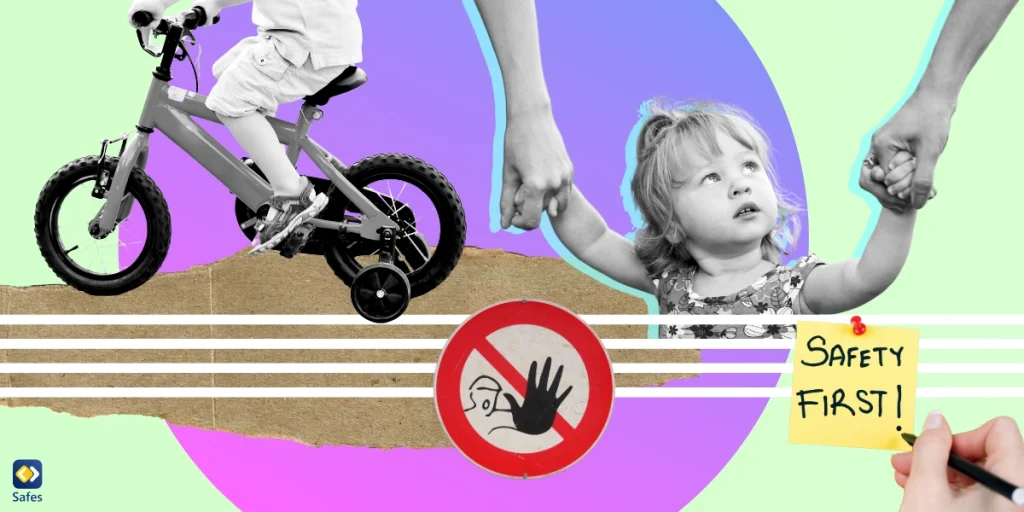Compulsive behavior is defined as “behavior that is difficult to stop or control” in the Oxford Advanced Learner’s Dictionary. People with compulsive lying have a disorder that makes them prone to lying. No matter how irrelevant the information is, they easily lie about it. People with compulsive lying have a persistent, uncontrolled impulse to lie frequently. It’s important to address compulsive lying since kids normally lie intentionally to achieve something. Keep in mind that children are significantly more likely to lie than adults, as it’s a part of their developmental milestones. Therefore, it’s crucial to determine the cause instead of degrading or punishing the liar. Is your child lying more than usual and do you suspect it might be compulsive lying? In this blog, we’ll address signs of compulsive lying in children, the possible causes, and how to handle it.
Download and Start Your Free Trial of the Safes Parental Control App
Different Types of Liars
There are three types of liars: natural liars, pathological liars, and compulsive liars.
Natural liars are the most prevalent kind of liars. Natural liars are those who can lie easily and with high success and expertise. They’re simply highly skilled at lying; they don’t believe their own lies.
Pathological liars: Pathological lying can often be a sign of antisocial personality disorder (commonly referred to as a psychopath). A pathological liar is typically viewed as clever, egotistical, and manipulative.
Compulsive liars: Compulsive liars twist the truth in all circumstances, no matter how big or minor. Telling the truth is hard and uncomfortable for a compulsive liar, yet lying feels perfect.

Signs of Compulsive Lying in Children
Now the importance is clear, you might wonder how to identify if your child is a compulsive liar. Some of the signs compulsive liars show are:
- Frequent exaggeration
- Inconsistent and contradicting stories
- Unnecessary lying
- Difficulty maintaining eye contact
- Possibly having additional personality disorders, such as excessive mood swings, lack of empathy, or violent aggression.
- Lying to dominate or influence others
- Lying a lot more than their peers
- Lying even though it damages relationships

Why do Children Lie? Possible Causes of Compulsive Lying in Children
There are different reasons why children may lie. Let’s look at possible causes of why kids lie:
- Developing a theory of mind: The theory of mind is the capacity to foresee what another person will believe or feel, as well as the recognition that others’ thoughts and emotions may differ from one’s own.
- Experimenting and creativity: Children might want to test their new skill
- Low self-esteem: Some kids lie out of concern that others won’t like them if they tell the truth.
- Attention-seeking behavior: Depending on their needs for love and attention, children may lie to parents or peers in order to obtain their respect and affection.
- Fear of punishment or rejection: Because of the fear of getting punished by elders or rejection by peers, kids might lie.
- Emotional or psychological trauma
- More white matter in the brain: According to studies, the front part of the brain, the prefrontal cortex, has more white matter among pathological liars. It makes sense that someone with more white matter would be more likely to lie because the white matter is associated with quicker connections, linguistic fluency, and thinking processing.

How to Address Compulsive Lying in Children
If you have a child who compulsively lies, you may find yourself wondering how this happened and what to do. Social media could be the one to blame. With the rise of technology, children have easier access to social media. If you don’t want to restrict your child completely, you can think about using a parental control app like Safes. Safes offers features to keep your child safe online by filtering web results and inappropriate applications, and by limiting screen time. Safes also provides a free trial, so you can experience firsthand how these features can contribute to a safer digital environment for your child. It is available for Android, iOS, Windows, and macOS. It can be challenging to address this behavior, but it’s essential to do so. Here are some tips for addressing compulsive lying in children.
Avoiding Punishment and Criticism
Punishing a child for lying doesn’t necessarily solve the problem; in some cases, it might make it worse. Instead of punishing or criticizing, try to understand why your child is lying. Perhaps they’re afraid of disappointing you or believe that telling the truth would lead to negative consequences.
Creating A Safe and Open Environment for Communication
It’s important for children to feel comfortable talking with their parents. If a child feels they can’t come to you with the truth, they will continue to lie. Make sure you create a safe and open environment for communication. Let your child know that you won’t judge them and that honesty is always the best policy.
Teaching The Importance of Honesty and Integrity
Teach your child the importance of honesty and integrity. Explain that lying can damage relationships and break trust. Help your child understand that telling the truth, even if it’s not what you want to hear, is always the right thing to do.
Seeking Professional Help If Necessary
If your child’s lying is persistent or severe, it may be time to seek professional help. A therapist or counselor can work with your child to understand the underlying issues behind their lying behavior. They can also help your child develop healthy coping mechanisms and communication skills.
Conclusion
In recent years, many parents and teachers have noticed an alarming trend in children – compulsive lying. While children often tell lies to get out of trouble or to avoid punishment, compulsive lying is different. It’s an uncontrollable urge to lie that can become habitual behavior if left unaddressed. Compulsive lying in children is a significant concern that requires attention, especially if it becomes habitual behavior. However, with early intervention and the right support systems, children can overcome this disorder and grow up, to be honest individuals. By understanding the key points of this issue and the importance of intervention, you can create a brighter future for your children.
Your Child’s Online Safety Starts Here
Every parent today needs a solution to manage screen time and keep their child safe online.
Without the right tools, digital risks and excessive screen time can impact children's well-being. Safes helps parents set healthy boundaries, monitor activity, and protect kids from online dangers—all with an easy-to-use app.
Take control of your child’s digital world. Learn more about Safes or download the app to start your free trial today!




